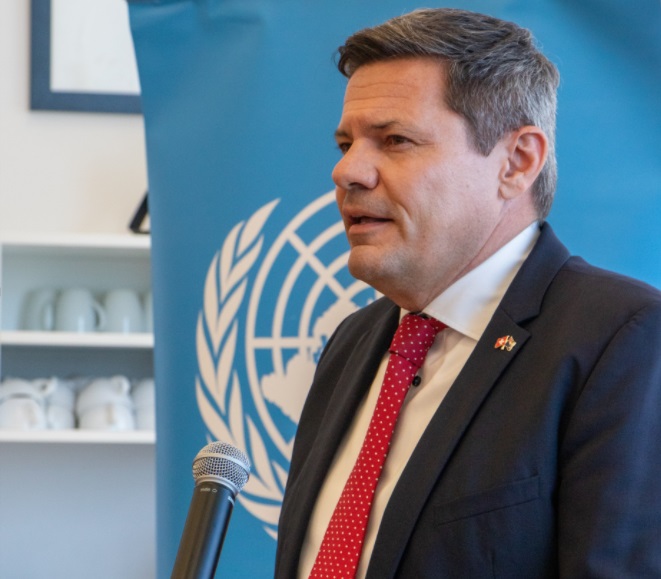UN Day Remarks by the Ambassador of Switzerland
29 November 2024
The United Nations Association of New Zealand appreciated the friendly support of the Embassy of Switzerland for our 2024 United Nations Day reception.
The following is a transcript of the remarks delivered by the Ambassador of Switzerland, His Excellency Mr Viktor Vavricka.
--
Honourable Minister, Distinguished Board Members, and Esteemed Members of the United Nations Association of New Zealand.
It is a privilege to join you in commemorating this year’s United Nations Day, and I extend my sincere gratitude for the opportunity to partner with your association on this occasion.
Switzerland and New Zealand share a profound commitment to multilateralism. Our nations have consistently fostered a positive and collaborative relationship within the United Nations and other international forums, driven by a dedication to peace, human rights, environmental protection, sustainable development, and democratic governance.
Both our countries champion a fair, rules-based international system and advocate for collaborative approaches to the complex challenges facing our world.
In 2023-2024, Switzerland has had the honor of serving as a non-permanent member of the United Nations Security Council, recently concluding our second presidency with a sense of accomplishment. Throughout our tenure, we have benefited from New Zealand’s exemplary model during its term on the Council in 2015-2016. A Swiss diplomat was seconded to New Zealand’s Ministry of Foreign Affairs and Trade (MFAT) for two years during that period, providing invaluable insights that informed Switzerland’s own Security Council preparations. Today, that diplomat leads our Security Council team within the UN Division of our Ministry, underscoring the enduring impact of our close partnership.
In these challenging times, nations that share our commitment to multilateralism must strengthen their resolve to uphold the international, rules-based system. The wars in Gaza and Ukraine, in particular, have exposed the limitations of the United Nations and of the implementation of international law, revealing a gap between the UN’s founding principles and the complex operational realities it faces. This order is under strain, threatened by double standards, and without substantial reform, the UN risks further erosion of its authority and global influence.
I commend New Zealand’s principled stance on the binding nature of international court decisions, reinforcing the importance of accountability and compliance with international law.
Now more than ever, the international community must reaffirm its commitment to upholding peace and security, protecting civilians, and preventing mass atrocities under all circumstances. The recent International Conference of the Red Cross and Red Crescent in Geneva reaffirmed the global resolve to uphold the Geneva Conventions.
The conventions’ mandate to “respect and ensure respect” applies universally. No state should be considered exempt from accountability. Neither exceptionalism, national interest, nor relativism should weaken the fundamental commitment to a rules-based international order governed by law.
As we look ahead, there are at least two priorities Switzerland and New Zealand can pursue together:
- Promoting Democratic Governance: New Zealand, with its robust democratic traditions, strong Pacific connections, and rich Māori heritage, offers valuable insights for strengthening democracy globally. Within the Pacific, the Pacific Islands Forum stands as a vital platform to advance democratic governance and shared values. In addition, resilient democracies are well-positioned to address the urgent threats posed by climate change, which especially impacts Pacific nations.
- International Geneva as a Key Resource for the Pacific: Known as the operational hub of the UN system, Geneva is the engine behind UN decisions. While New York may be considered the “dining room” where these decisions are formally endorsed, Geneva is the “kitchen” where they are prepared.
We strongly advocate for all Pacific Island states to establish a permanent mission in Geneva, as issues addressed here — including trade, fisheries, development, health, labour rights, human rights, and humanitarian issues — hold immediate relevance for the Pacific. Switzerland actively supports the establishment and maintenance of missions for small island nations through both financial and logistical assistance.
To help achieve universal representation in Geneva, we look forward to strengthening our cooperation with New Zealand to ensure Pacific voices are heard in this critical global forum.
In conclusion, as we navigate a period of prolonged uncertainty and complex global challenges, it is imperative that we forge a renewed sense of shared humanity within a multipolar world, creating new pathways to uphold a common vision of peace, human rights, prosperity, and environmental stewardship. This is the collective challenge that lies ahead for the next decade.
Thank you once again for the privilege of partnering with you in advancing these shared ideals.

His Excellency Mr Viktor Vavricka
Ambassador Viktor Vavricka was born in 1972, in Winterthur, canton of Zurich, Switzerland and graduated at the University of Zurich with a licentiate in law.
In 2002, he entered the service of the Federal Department of Foreign Affairs and was assigned as a stagiaire in Bern and Ottawa, and subsequently as a diplomatic staff member in the Directorate of International Law.
In 2007, he was transferred to Riyadh as Deputy Head of Mission. From 2009, he headed the Human Rights and International Humanitarian Law Section in the
Directorate of International Law and, from 2011, the Asset Recovery Task Force in Bern.
From 2013, he served as Deputy Head of Mission in Bangkok and from 2017 as Deputy Head of Mission in Berlin.
Since 2020, he has been Head of the Swiss Representation Office in the Occupied Palestinian Territory in Ramallah.
On 24 September 2021, the Swiss Federal Council appointed Viktor Vavricka as Ambassador Extraordinary and Plenipotentiary to New Zealand, Cook Islands, Fiji, Samoa, Tonga and Tuvalu, with residence in Wellington. He will also serve as Consul General to American Samoa.

